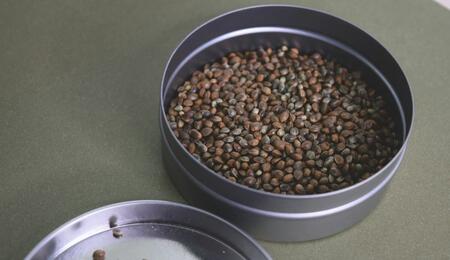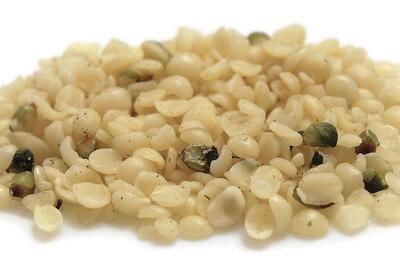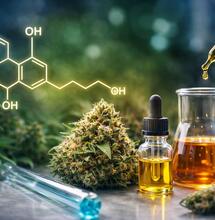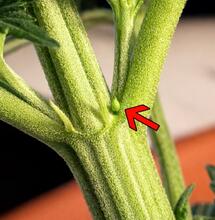Nutritional Value of Hemp Seeds

Raw cannabis plant material, such as leaves, stalks, and seeds contain all key nutrient compounds that the human body needs. That includes carbohydrates, protein, fat, water, vitamins, trace amounts of minerals like calcium and potassium, as well as omega-3 fatty acids. But if there’s one part of the plant that offers the most nutritional value, it’s hemp seeds. In this article, learn more about the nutritional value of cannabis, and in particular the myriad health benefits associated with hemp seeds and hemp seed oil.
Cannabis has been an important source of nutrition since ancient times. Archeological finds have noted the presence of cannabis products, while recipes have been handed down through time in many cultures. Of all parts, the seeds of the cannabis plant offer the highest nutritional value.
As humans, our dietary needs are primarily proteins, fats and carbohydrates. The vitamins and minerals we need are present within these essential nutrients in the foods we eat. Most people consume adequate, if not excessive, amounts of carbohydrates, which leads to illnesses such as diabetes. Excessive carbohydrates in the diet are converted within the body into triglycerides, a fatty acid that also contributes to plaque build-up on arterial walls, known as atherosclerosis. Atherosclerosis is basically hardening of the arterial wall, affecting the ability of the blood vessels to be flexible with the changes that occur in blood pressure.
Cannabis or hemp seeds contain a low amount of carbohydrates, approximately ten percent by weight. Adding hemp seeds in your daily meals every once in a while can be very beneficial for your health, and possibly save you from medical conditions like diabetes, atherosclerosis, and many more.
Hemp Seeds and Oil for Health and Longevity
The greatest nutritional value of Cannabis seed is in its oil or fat content. Cannabis seed is approximately 35% (by weight) Essential Fatty Acids or EFAs. The EFAs are considered a perfect ratio of 3:1 between Omega-6 and Omega-3 fatty acids, a ratio that reduces the risk of cancer and cardiovascular disease, the most prevalent chronic illnesses in the world today. The body cannot produce EFAs by itself, therefore it’s important to take these types of fats through foods.
Hemp seed oil has zero cholesterol but it does contain five percent monosaturated and five percent saturated fatty acids. Cardiovascular disease, cancer, inflammatory, auto-immune, and possibly Alzheimer’s diseases have all been linked to excessive Omega-6 levels in the diet.
While hemp oil contains 3:1 more Omega-6 than Omega-3, it is still far less than the average diet of 12:1 or 20:1. This high ratio of Omega-6 to Omega-3 fatty acids is a modern phenomenon and some say our bodies are not responding well. One reason for this change is the diet fed to livestock. Where once livestock grazed on grass, they are now fed a grain-based diet. Corn is the primary grain used to feed livestock and corn is ubiquitous in the modern-day diet in ways we do not think about. Most sweeteners are corn-based and do not come from expensive sugar cane, as they once did. Omega-6 oils are the ones found in vegetables, seeds and nuts. This grain-based diet changes the Fatty Acid ratio in livestock, as it does in humans.
The one important Omega-6 oil to consume is Gamma-linolenic acid or shortened GLA. This source of Omega-6 has been shown to lower inflammatory states and certain disease processes. It is a precursor to arachidonic acid, itself a precursor of anti-inflammatory mediators in the body and other EFAs needed for good health. Arachidonic acid is also a precursor for anandamide, one of our body's endocannabinoids. Hemp seed oil is 1% GLA.
The important Omega-3 fatty acids to consume are EPA and DHA. ALA, a third Omega-3 fatty acid, requires conversion to DHA and EPA before the body can use it and this is done with only ten-percent efficiency in our bodies. Hemp seed oil is better quality oil that contains EFAs in the form of both Omega-6 and Omega-3, in a perfect ratio.
Scientific research has shown that hemp seed oil can reduce sensitivity to pain and help with mood disorders. These results are likely due to the EFAs it contains. The more Omega-3 we consume, the better it is for our health because Omega-3 competes with Omega-6 for a limited number of receptor sites. The same receptor sites that would otherwise increase inflammation upon continued interaction with Omega-6 fatty acids. However, EFAs consumed in the proper ratio not only decrease the risk of disease but also promote healthy nervous system activity and balanced production of hormones and steroids.

Vitamin Content of Hemp Seed Oil
The oil also contains fat-soluble Vitamin E, which is again important for cardiovascular health. Vitamin E makes the arterial wall less likely to have plaque deposits as well as it contributes to a softer and smoother skin. Vitamin E has further been associated with healthy function of the reproductive system.
Vitamin A is another fat-soluble vitamin found is hemp seed oil. That’s another compound nourishing the skin, as well as encouraging the healthy formation of the cells lining our lungs.
In addition, the hulls of hemp seeds offer lots of healthy dietary fiber for both humans and animals. Hulled hemp seeds can be eaten raw or can be used to prepare flour for bread, pasta, pancake mix and more.
Hemp Protein is Healthy Protein
Another nutritional need of the human body? Of course, it’s protein! Protein in most plants is difficult to digest, but cannabis protein is easy one. This has also been evaluated in research, more than a decade ago. Hemp seed protein scores higher than most nuts, grains and legumes, according to a study published in the Journal of Agricultura and Food Chemistry. Hemp seed protein is a more bio-available protein that also offers anti-fatigue and immune-enhancing effects. In other words, it’s the type of protein that boosts energy.
Hemp seed protein contains 65% edestin protein. This is a complete protein that resembles albumin manufactured by our bodies. Albumin is the precursor amino acid molecule to make immunoglobulins, the body’s disease-fighting antibodies. These albumin edestin protein precursor molecules make it easier for the human’s body immune system to do its job of protecting from foreign invaders of bacteria, viruses and fungi.
How to Consume Hemp Seeds and Enjoy Its Nutritional Benefits?
Hemp is consumed in many ways. An easy way to incorporate hemp seed oil into your diet is by taking capsules daily. But you can always go a step further and integrate hemp seeds or hemp seed oil in home-made meals and beverages.
For example, the whole seeds have a nutty flavor when roasted. The roasted seeds can be ground or crushed and sprinkled on salads or sandwiches. A delicious alternative to a plain grilled cheese sandwich is one with roasted cannabis seeds sprinkled inside.
Hemp milk is made from hulled seeds and extracted with water. The solution rich with Omega-3 and Omega-6 fatty acids is creamy, like milk, and can be used in baking as a substitute for dairy milk. It can be poured onto cereal or used in coffee drinks and fruit smoothies. Hemp protein powder can also be added to that fruit smoothie and will give it a nutty taste.
There’s really no limit to how you can use cannabis or hemp seeds in your daily diet and benefit from its valuable nutritional content. And it’s pity not to use something that Mother Nature has naturally provided for us.
Also read on Soft Secrets:













